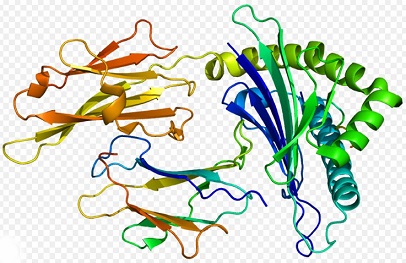BREAKING! HLA-G Protein Which Is Typically Upregulated In Cancers Found To Be Also Upregulated In COVID-19 Infections!
Nikhil Prasad Fact checked by:Thailand Medical News Team Mar 30, 2024 1 year, 8 months, 3 weeks, 2 days, 8 hours, 54 minutes ago
COVID-19 News: The Human Leukocyte Antigen-G (HLA-G) protein has long been a subject of interest in the realm of cancer research due to its role in immune evasion and tumor progression. However, a recent breakthrough study review by researchers from the Institute of Translational Immunology, Medical School Theodor Fontane-Germany, Martin Luther University Halle-Wittenberg-Germany and Fraunhofer Institute for Cell Therapy and Immunology-Germany has revealed an unexpected connection between HLA-G and COVID-19 infections, shedding new light on its multifaceted functions in immune regulation and disease pathogenesis. This
COVID-19 News report delves into the intricate mechanisms governing HLA-G expression, its implications in cancer and viral infections, and potential therapeutic avenues, aiming to provide a detailed understanding of this enigmatic molecule.
 HLA-G Protein Which Is Typically Upregulated In Cancers Found To
HLA-G Protein Which Is Typically Upregulated In Cancers Found To
Be Also Upregulated In COVID-19 Infections
The Non-Classical HLA Class I Molecule
HLA-G, initially identified in immune-privileged organs such as cytotrophoblasts, was primarily associated with fetal-maternal immune tolerance. However, subsequent research uncovered its expression in various pathophysiological conditions, including cancers and viral infections. Unlike classical HLA class I molecules, HLA-G exhibits restricted tissue expression and limited peptide diversity due to alternative splicing and unique regulatory regions. Over 200 HLA-G alleles encode diverse isoforms, each with distinct functional properties impacting its interactions with immune receptors.
A number of receptors binding to HLA-G have been identified including e.g. KIR2DL4, ILT2, ILT4, CD8 and CD160 present on cells of the immune system, like T cells, B cells, NK cells and diverse antigen presenting cells (APCs).
Regulation of HLA-G Expression
The regulation of HLA-G expression is a complex interplay of genetic, epigenetic, and posttranscriptional mechanisms. Genetic variations, such as single nucleotide polymorphisms (SNPs), influence HLA-G expression levels and disease susceptibility. Environmental factors, including cytokines, stressors, and hormonal signals, modulate HLA-G expression, highlighting its dynamic response to microenvironment cues. Additionally, microRNAs and RNA-binding proteins fine-tune HLA-G expression post-transcriptionally, adding layers of complexity to its regulation.
HLA-G's Immune Modulatory Properties
HLA-G's interactions with immune cell receptors such as ILT2, ILT4, and NKG2/CD94 play a pivotal role in immune modulation. These interactions lead to immune suppression, impacting T cell, NK cell, and B cell functions. HLA-G promotes the generation of regulatory T cells and tolerogenic dendritic cells, contributing to immune tolerance and tumor progression. Moreover, HLA-G's involvement in trogocytosis and its ability to shape immune cell phenotypes highlight its critical role in immune modulation and disease pathogenesis.
t;
HLA-G Expression in Tumors and Clinical Relevance
In the context of tumors, HLA-G expression has significant clinical implications. Its correlation with immune evasion and aggressive disease behavior underscores its potential as a prognostic marker and therapeutic target. However, challenges in HLA-G detection and quantification necessitate standardized protocols for accurate assessment. The interplay between HLA-G isoforms, immune checkpoints, and the tumor microenvironment warrants further investigation to develop targeted therapeutic strategies for HLA-G-associated cancers.
HLA-G Expression in Viral Infections
Viral infections, including COVID-19, exhibit altered HLA-G expression patterns that contribute to immune evasion and disease progression. HLA-G upregulation in infected cells impacts immune responses and disease outcomes.
Polymorphisms in HLA-G genes influence susceptibility to viral infections such as HPV and impact disease prognosis. The complex interplay between HLA-G, viral factors, and immune responses underscores its role in viral pathogenesis and immune modulation.
HLA-G Expression in COVID-19 and Clinical Implications
Recent studies have identified elevated HLA-G levels in COVID-19 patients, particularly in lung epithelial cells. This upregulation correlates with disease severity and immune dysregulation, highlighting HLA-G as a potential biomarker and therapeutic target in COVID-19 management. However, the mechanisms driving HLA-G expression in COVID-19 remain incompletely understood, necessitating further research into its functional consequences and clinical implications.
Therapeutic Potential and Future Directions
The discovery of HLA-G's involvement in both cancer and COVID-19 infections opens new avenues for therapeutic interventions. Targeting HLA-G isoforms, receptor interactions, and immune checkpoints holds promise for precision medicine and immunotherapy strategies. Standardized methodologies and comprehensive immune profiling are essential for elucidating HLA-G's multifaceted roles and advancing targeted therapies for patients with HLA-G-associated diseases.
Conclusion
HLA-G's intricate role in immune regulation, cancer progression, and viral infections highlights its significance as a key player in disease pathogenesis. Further research into HLA-G's mechanisms of action, isoform-specific functions, and therapeutic targeting is crucial for developing effective treatments and improving patient outcomes. The dynamic interplay between HLA-G, immune cells, and the microenvironment underscores its potential as a diagnostic marker, prognostic indicator, and therapeutic target across various disease contexts.
The study findings were published in the peer reviewed journal: Human Immunology.
https://www.sciencedirect.com/science/article/pii/S0198885924000521
Thailand
Medical News would to add that urgent studies are also need to assess if HLA-G protein upregulation in COVID-19 is anyway linked to increased risk of cancers or faster tumor progression.
For the latest
COVID-19 News, keep on logging to Thailand Medical News.
